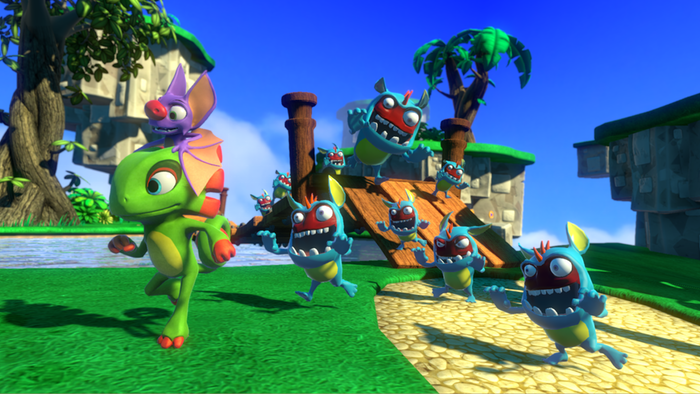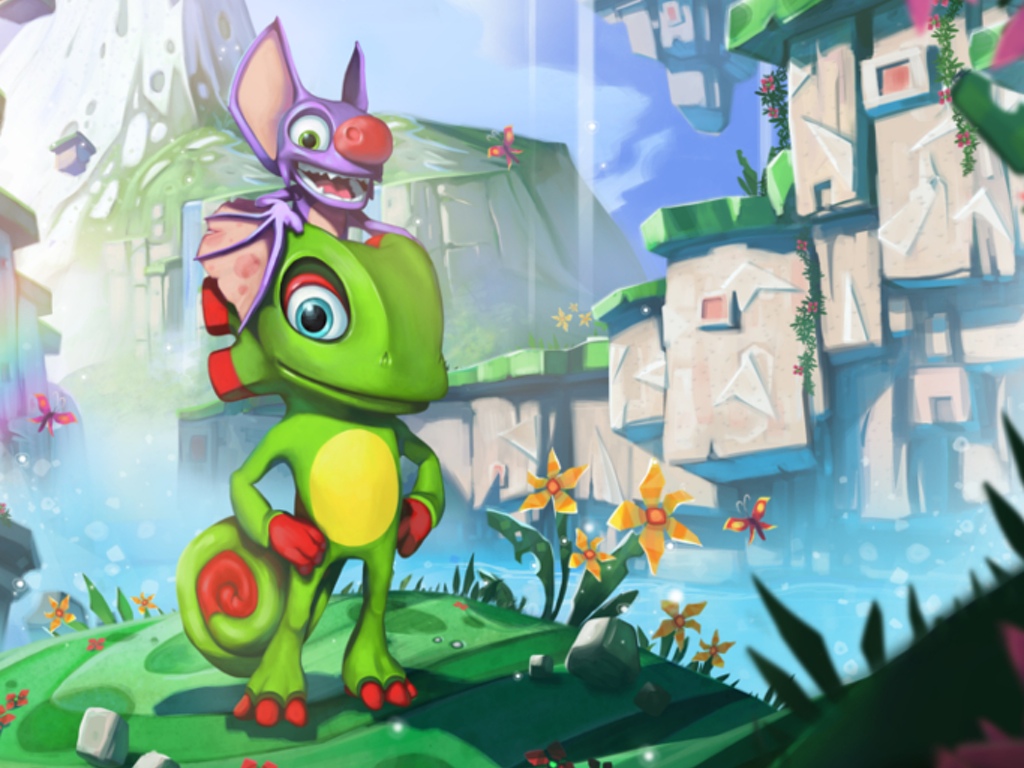As the Kickstarter Campaign is running strong with over $2.8 million pledged, we thought it would be appropriate to take a look back at what made the classic Rareware titles successful, and what we can look forward to with Yooka-Laylee at the forefront of the adventure platformer revival. Though this new IP is not the only platformer attempting to restore the genre to its former glory, the influence of the seasoned developers at Playtonic will surely inspire many designers currently working in the industry.
Some indie titles have already run successful campaigns on Kickstarter, such as Lobodestroyo and Happy Hell. It’s apparent that in the coming years, we’ll see many attempts to breathe new life in genres that have essentially been abandoned. With a new generation of developers who grew up playing these influential titles, it’s going to be interesting to see what kinds of titles crop up in the next 5-10 years. To make a better assessment of what we may have on our hands, let’s go back about twenty years, to the mid 1990s…
Sony raised a grand following by hosting Playstation titles like Spyro the Dragon and Crash Bandicoot, and in doing so strengthened the influence and dominance of adventure platformers. The genre was a staple for any game system, from home console to handheld. On the Nintendo 64 however, a powerful force only known to us by a shiny golden “R” somehow magically created incredible worlds contained in those plastic cartridges. As they invited us into those worlds, we were forever imprinted by the visual style, music, and characters, as well as the atmosphere all those elements created when combined in a way only Rareware could. To this day, it’s a good bet that almost everyone who played Banjo Kazooie, DK 64, or Conker’s Bad Fur Day can distinctly remember songs, noises, and cutscenes that vividly paint nostalgic gameplay sessions in their minds.
Today’s market is filled with more realistic titles that do an amazing job of bringing video games ever closer to film quality. Through the last decade these franchises have risen to become the standard of quality. However, more often than not we don’t use our imagination as much when playing these games, particularly the plethora of military-style FPS titles. We have a large number of fantasy games, notably The Elder Scrolls and Dragon Age, but they require a lot of practical thought. Not very often do we play games that allow our minds to wander and interact with completely strange and impractical situations. Of course we encounter obscure or even macabre moments when we play games like Dead Space or Silent Hill, but they lack the strange flavor only found in platformers developed by Rareware.
Imagine a goofy magical world full of humorous characters that convey a mystical yet oddly childish vibe, and you have the base upon which these classic platformer titles built their game atmosphere. When the jungle xylophone (that’s probably not a thing, but it’s what the Banjo-Kazooie music sounded like) and upbeat horn music accents the world, the game levels take on an endearing feeling that can be extremely versatile.
Why revive adventure platformers? What is the reason for so many developers going back to the roots and making titles inspired by classic games of the past? These are probably questions that answer themselves when they leave the mouth of anyone who has been playing games for most of their lives. For many (probably most) of us, we can look back through our history of playing video games and pick out a time (or several times) when we played a game that made us feel something we never thought possible. The moments we connected to those game worlds by a controller and a screen, we reached something beyond that space where we sat with a console or computer. Many may recall even forgetting they were sitting there playing a game, and found that they could consciously identify the moments when they snapped back to reality, and the world went back to being trapped in a television or monitor.
Perhaps it’s only a perspective we had as children, or perhaps as we get older, the more we know, the less we can be impressed or immersed. An important endeavor has been initiated here, with the development of Yooka-Laylee, and it’s a necessary one for developers to find ways to instill those feelings again. So why are we developing games inspired by classic franchises and genres? We’re looking for the next big step in escapism: bringing the player back into a virtual reality, entertaining them, mesmerizing them, so that when they save and quit because it’s time for work, school, or they just remembered to eat that day, they’ll leave the game world with imprints of what they experienced in the game.
The point here is that the video game industry is changing in many ways. With the strengthening of indie game development and the change in management happening in the AAA side of things, we’re making room for more ideas to bloom. The desires of today’s gamer are being heard and addressed, and for many of us, we want that nostalgic feeling back. The proper approach to reviving a genre is an important step in analyzing the future of game development, as we’re always looking to see how the audience receives changes. Yooka-Laylee is an instant celebrity, given its staff of developers who are respected and knowledgeable.
Creating new titles and franchises are important in bringing variety to the industry, but there’s always room for nostalgia. Yooka-Laylee combines the two, bringing back the musk of classic platformers while embracing modern gameplay mechanics like expanding worlds and gameplay modifiers.







[…] has completely eluded our attention here on Cliqist, getting only a brief mention in a Yooka-Laylee article a year ago. Fitting, since like that game, Lobodestroyo sells itself on being just like […]